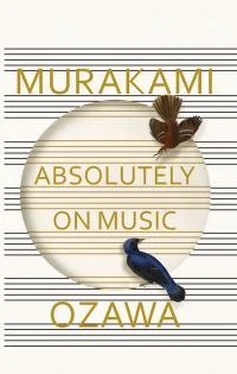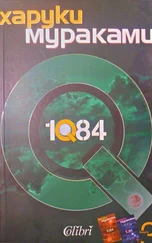In that sense, this is not a standard book of interviews. Nor is it what you might call a book of “celebrity conversations.” What I was searching for—with increasing clarity as the sessions progressed—was something akin to the heart’s natural resonance. What I did my best to hear, of course, was that resonance coming from Ozawa’s heart. After all, in our conversations I was the interviewer and he was the interviewee. But what I often heard at the same time was the resonance of my own heart. At times that resonance was something I recognized as having long been a part of me, and at other times it came as a complete surprise. In other words, through a kind of sympathetic vibration that occurred during all of these conversations, I may have been simultaneously discovering Seiji Ozawa and, bit by bit, Haruki Murakami. Needless to say, this was a tremendously interesting process.
Let me give an example of what I’m talking about. As someone who has never seriously read a musical score, I could not fully comprehend that process in concrete detail. But as I listened to Ozawa talk about it, observing his facial expression and tone of voice, I came to understand the deep importance of the act to him. Music does not take shape for him until he has read the score, burrowing into it with complete determination until he is satisfied that he has mastered every last detail. He stares at the complex symbols amassed on a two-dimensional printed page, and from them he spins his own three-dimensional music. This is the foundation of his musical life. And so, early in the morning, he gets out of bed, shuts himself up alone in his own private space, and reads scores for hours with total concentration, deciphering cryptic messages from the past.
Like Ozawa, I also get up at four in the morning and concentrate on my work, alone. In winter, it’s still pitch dark, with no hint of sunrise and no sound of birds singing. I spend five or six hours at my desk, sipping hot coffee and single-mindedly tapping away at the keyboard. I’ve been living like this for more than a quarter of a century. During those same hours of the day when Ozawa is concentrating on reading his scores, I am concentrating on my writing. What we are doing is entirely different, but I imagine we may well be the same when it comes to the depth of our concentration. It often occurs to me that this life of mine would not exist if I lacked the ability to concentrate. Without concentration, it would no longer be my life. I suspect that Ozawa feels the same way.
Thus, when Ozawa talked about the act of reading a score, I could grasp what he was saying concretely and vividly, as if he had been talking about me. This happened at any number of points in our discussions.
Between November 2010 and July 2011, and in several different places (Tokyo, Honolulu, Switzerland), I seized the opportunity to conduct the interviews compiled in this book. It was a decisive period in Seiji Ozawa’s life, when his primary activity consisted of recuperation. He had a number of follow-up surgical procedures, and he was going to the gym, working hard on his rehabilitation to regain the strength he had lost after his original surgery for esophageal cancer. He and I belong to the same gym, so I saw him in the pool now and then, soberly performing his exercises.
In December 2010, Ozawa performed a dramatic comeback concert at Carnegie Hall with the Saito Kinen Orchestra, the orchestra he co-founded in 1984 to honor his mentor Hideo Saito (1902– 74). (“Kinen” means “memorial.”) I could not attend the concert, unfortunately, but judging from the recording, I found it a wonderful, inspired performance, though the extreme physical toll it took on Ozawa was obvious to all observers. After six months of recuperation, Ozawa then directed the Seiji Ozawa International Academy Switzerland, which is held every summer in the town of Rolle on the banks of Lake Geneva; and after intensively training a select group of young musicians, he took to the podium again in Geneva and Paris, conducting the academy’s orchestra in two highly successful concerts. This time, I accompanied Ozawa to observe the entire ten-day period of training and performance. I was simply awestruck by the fierce intensity with which he threw himself into the work. I could not help worrying about his health, however, and how it would hold up under such a strain. All the music I heard was wonderful but Ozawa was the one who really made it possible, and he did so by using up every last bit of energy that he had to give.
As I watched him in action, however, one thing dawned on me: He can’t help himself; he has to do this. His doctor, his gym trainer, his friends, and his family could all try to stop him (and of course they did try, to a greater or lesser degree), but this was something he had to do. For Seiji Ozawa, music was the indispensable fuel that kept him moving through life. Without periodic injections of live music into his veins, he could not go on living. There was only one way in this world for him to feel truly alive, and that was for him to create music with his own hands and to thrust it as a living, throbbing thing into the faces of an audience: “Here!” Who could possibly tell him to stop? I too wanted to say to him, “You really ought to hold off a little, take some time to recover, and start performing after you’ve got your strength back. I understand how you feel, but you know what they say—‘Slow and steady wins the race.’ ” Really that was the only reasonable response, but I couldn’t bring myself to say it to him when I saw him wringing every ounce of strength out of his body to stand upright on the podium. I felt that those words would become a lie once I spoke them. To put it simply, this man was living in a world that transcended reasonable ways of thinking, just as a wolf can only live deep in the forest.
The interviews in this book were not undertaken to comprise a sharply chiseled portrait of Seiji Ozawa. They are intended neither as reportage nor as a theory of what makes one person tick. My only purpose in this book was for me, as a music lover, to have a discussion of music with the musician Seiji Ozawa that was as open and honest as possible. I simply wanted to bring out the ways that each of us (though on vastly different levels) is dedicated to music. That was my original motive, and I like to think that, to some extent, I have succeeded. The experience has left me with the deep satisfaction of knowing that I spent several delightful days with Seiji Ozawa listening to music. Perhaps the most accurate title for the book would have been My Afternoons with Seiji Ozawa.
It will be clear to anyone who reads this book that there are some breathtaking gems scattered among Ozawa’s many pronouncements. He speaks plainly, and the words he chooses flow naturally as part of the conversation, but among them lurk finely honed fragments of a soul as keen as a blade. To put it in musical terms, these are like subtle “inner voices” that you would fail to catch in a piece of music if you were only half listening. In that sense, Ozawa was an interviewee with whom it was impossible to relax. I had to stay constantly alert in case I might miss some furtive tone that I knew would be there. If I missed those subtle cues, the very meaning of what he said could be lost.
In that sense, Seiji Ozawa is simultaneously an unschooled “child of nature” and a fountain of deep, practical wisdom; a man who must have what he wants immediately and who can be infinitely patient; a man with bright confidence in the people around him who also lives in a deep fog of solitude. To emphasize just one side of this complex man would present a distorted portrait. In this book I have tried to reproduce what he told me as fairly as possible, in written form.
In any case, the time I spent with Seiji Ozawa was tremendously enjoyable for me, and I hope through this book to be able to share some of that joy with my readers. I would like to express my deep thanks here to Seiji Ozawa himself for having granted me so much time. Continuing these interviews at regular intervals over a long period involved many logistical difficulties, but my greatest reward came when the maestro told me: “Come to think of it, I’ve never really talked about music like this before, in such a focused, organized way.”
Читать дальше











